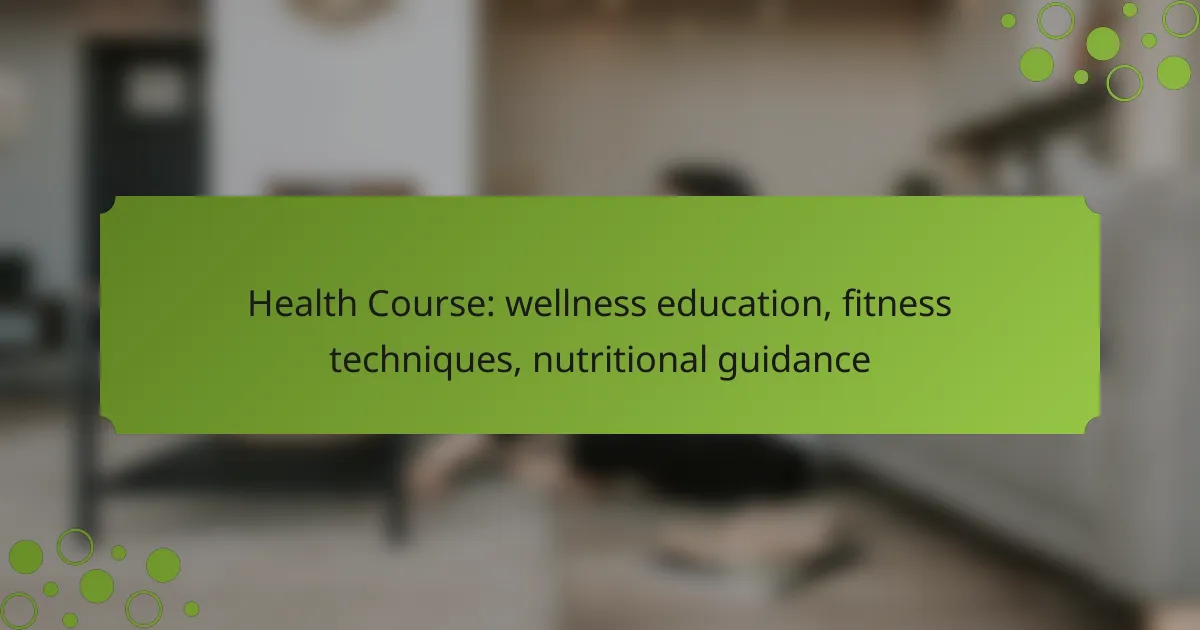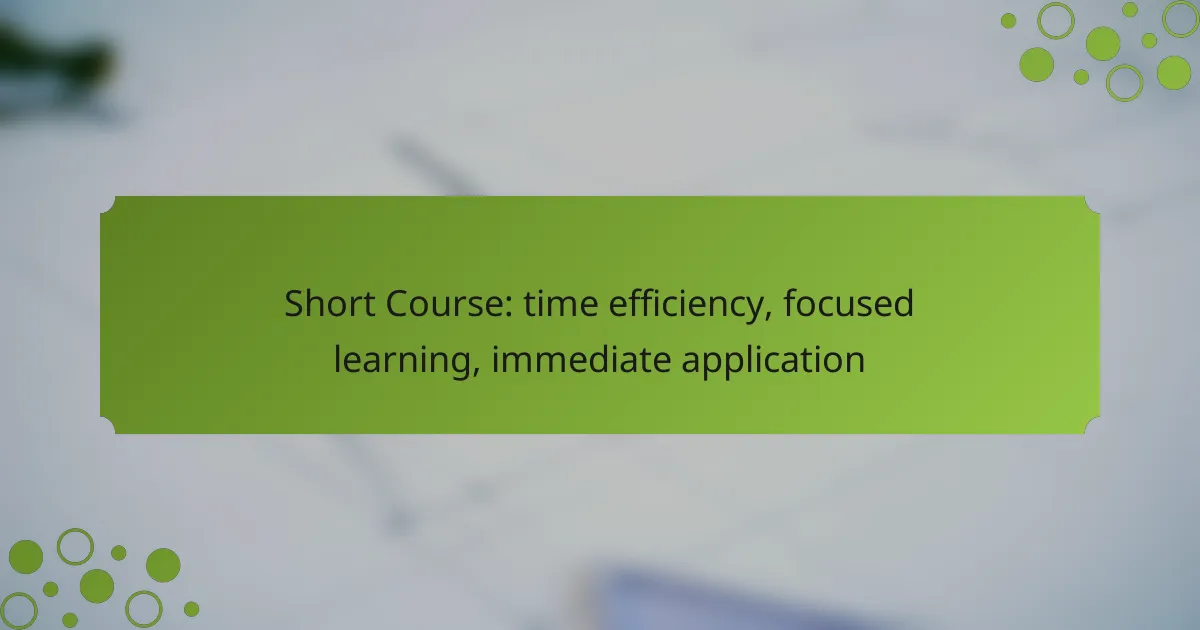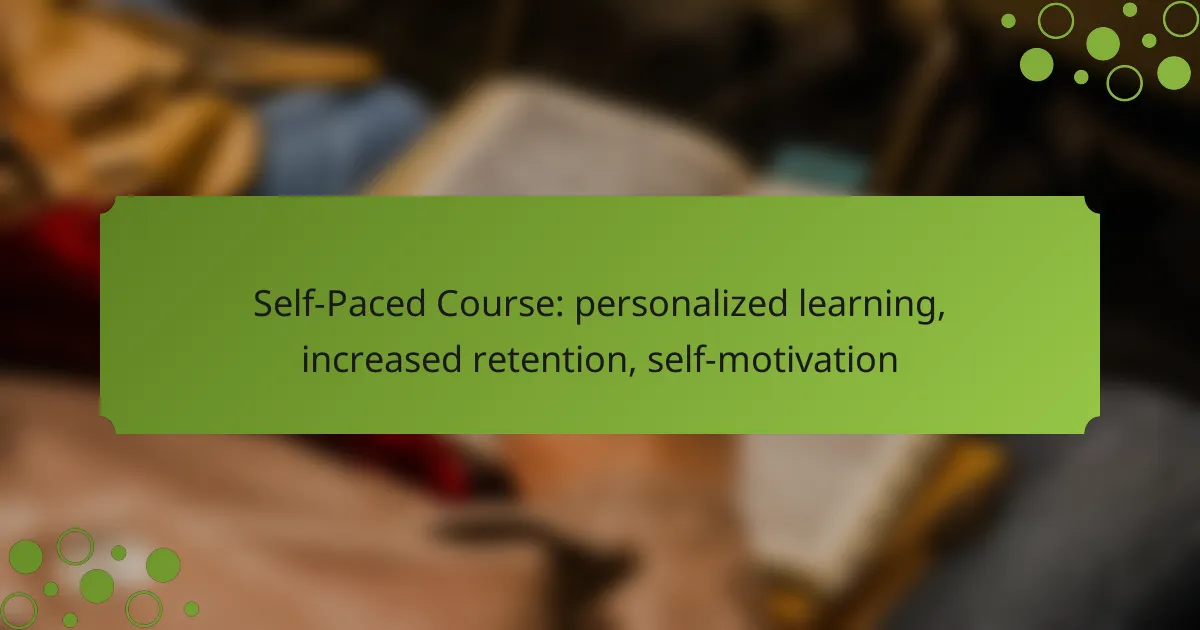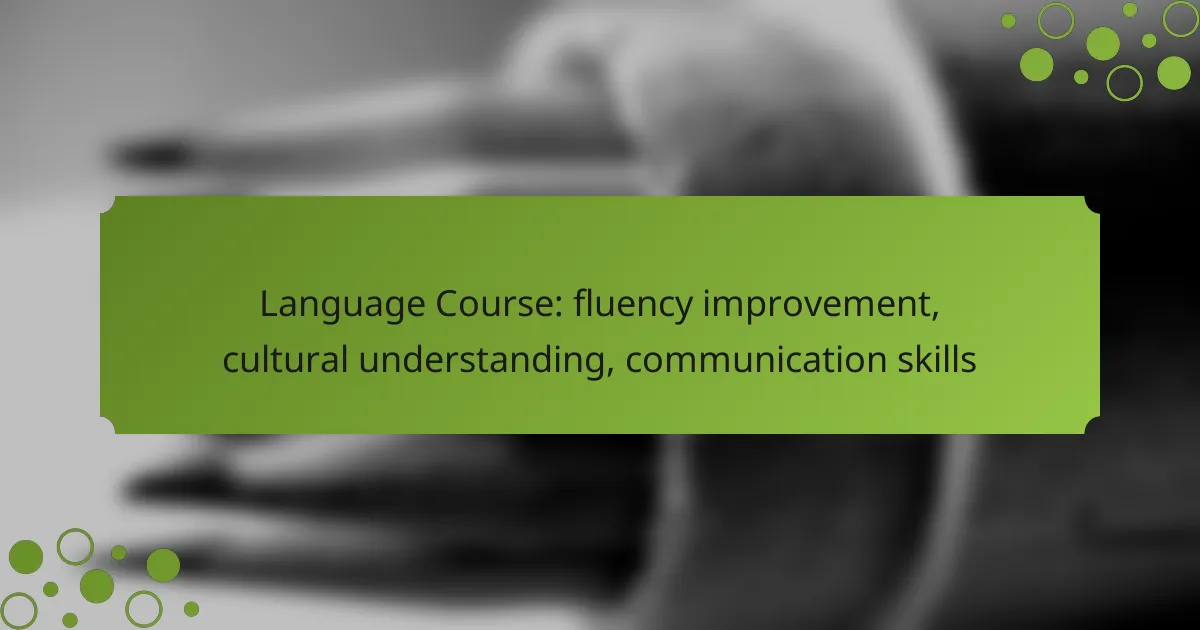Explore the best online health courses in Canada that emphasize wellness education, fitness techniques, and nutritional guidance. These courses equip individuals with practical knowledge to enhance their physical and mental well-being, promoting informed lifestyle choices for a healthier life.
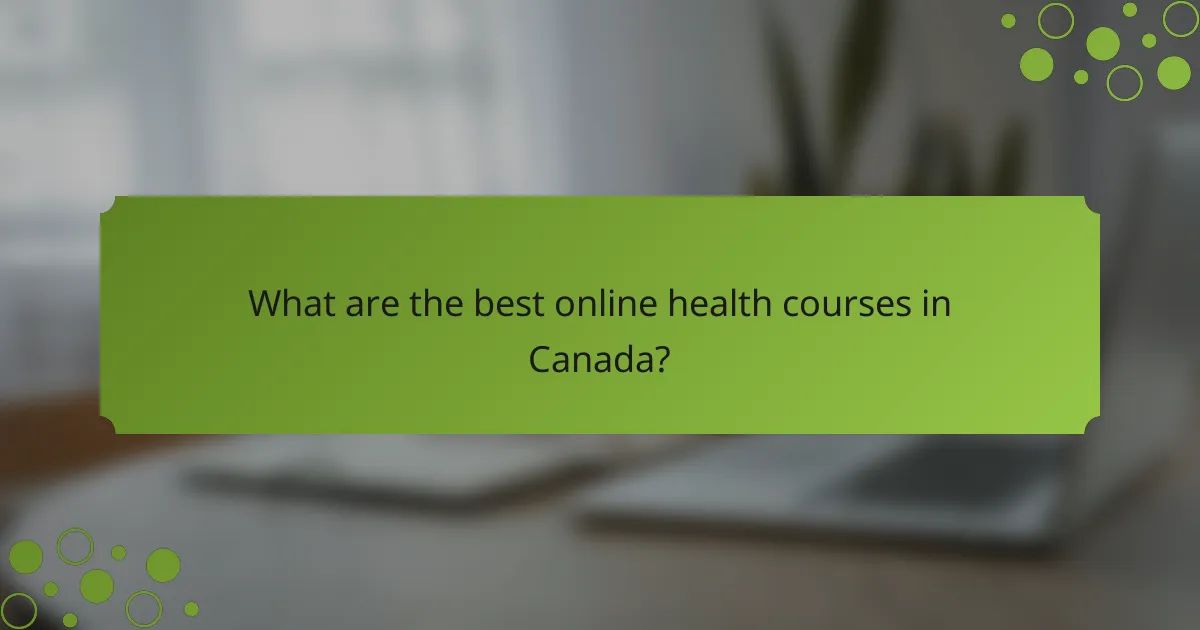
What are the best online health courses in Canada?
The best online health courses in Canada focus on wellness education, fitness techniques, and nutritional guidance. These courses are designed to provide practical knowledge and skills that can be applied in everyday life, making them accessible and beneficial for a wide audience.
Coursera’s Health and Wellness Specialization
Coursera offers a comprehensive Health and Wellness Specialization that covers various aspects of personal health, including mental well-being and physical fitness. This program typically includes multiple courses that guide learners through essential wellness concepts, practical strategies, and evidence-based practices.
Participants can expect to engage in interactive content, including video lectures and quizzes, which enhance the learning experience. Completing this specialization can provide a strong foundation for those looking to improve their own health or pursue a career in wellness coaching.
edX’s Nutrition and Health Program
edX features a Nutrition and Health Program that emphasizes the relationship between diet and overall health. This program is structured to help learners understand nutritional science, dietary guidelines, and the impact of food choices on health outcomes.
Courses often include case studies and practical applications, allowing participants to analyze real-world scenarios. This program is suitable for individuals interested in enhancing their nutritional knowledge or those considering a career in nutrition and dietetics.
FutureLearn’s Fitness and Nutrition Courses
FutureLearn provides a variety of Fitness and Nutrition Courses that cater to different interests and skill levels. These courses cover topics such as exercise physiology, meal planning, and the psychology of fitness, making them ideal for anyone looking to deepen their understanding of health and fitness.
Many courses are designed in collaboration with leading universities and health organizations, ensuring high-quality content. Participants can benefit from flexible learning options, allowing them to study at their own pace while gaining valuable insights into effective fitness strategies and nutritional practices.

How can wellness education improve health?
Wellness education enhances health by providing individuals with the knowledge and skills needed to make informed decisions about their physical and mental well-being. By focusing on holistic health practices, it encourages proactive management of health through various lifestyle choices.
Enhances mental well-being
Wellness education plays a crucial role in enhancing mental well-being by teaching stress management techniques and promoting emotional resilience. Individuals learn to recognize the signs of stress and anxiety, allowing them to implement coping strategies such as mindfulness, meditation, or physical activity.
Incorporating mental health resources into wellness education can lead to improved mood and reduced symptoms of depression. Regular participation in wellness programs has been shown to foster a supportive community, which can further enhance emotional stability and overall happiness.
Promotes healthy lifestyle choices
Wellness education promotes healthy lifestyle choices by providing practical guidance on nutrition, exercise, and self-care. Participants learn about balanced diets, portion control, and the importance of regular physical activity, which can lead to better health outcomes over time.
For example, understanding the benefits of consuming a variety of fruits and vegetables can encourage individuals to incorporate these foods into their daily meals. Additionally, wellness education often includes tips on setting achievable fitness goals, such as aiming for at least 150 minutes of moderate exercise each week, making it easier to adopt and maintain a healthier lifestyle.

What fitness techniques are most effective?
Effective fitness techniques focus on maximizing results through efficient workouts and sustainable practices. High-Intensity Interval Training (HIIT) and yoga are two popular methods that cater to different fitness goals and preferences.
High-Intensity Interval Training (HIIT)
HIIT involves short bursts of intense exercise followed by brief recovery periods. This technique can significantly improve cardiovascular fitness and burn calories in a shorter time compared to traditional steady-state workouts.
To implement HIIT, choose exercises like sprinting, cycling, or bodyweight movements. A common structure is 20 seconds of intense effort followed by 10 seconds of rest, repeated for several rounds. Aim for sessions lasting 15 to 30 minutes, two to three times a week.
Be cautious of overtraining; ensure adequate recovery between sessions to prevent injury. Beginners should start with lower intensity and gradually increase as fitness improves.
Yoga for flexibility and strength
Yoga combines physical postures, breathing techniques, and meditation to enhance flexibility, strength, and mental clarity. It is beneficial for people of all fitness levels and can be adapted to individual needs.
Practicing yoga regularly can improve muscle tone and joint health, making it an excellent complement to more intense workouts. Aim for at least two sessions per week, focusing on various styles such as Hatha for beginners or Vinyasa for a more dynamic flow.
To maximize benefits, consider incorporating props like blocks or straps to assist with poses. Pay attention to your body’s signals to avoid strain, and remember that consistency is key to seeing progress over time.

What nutritional guidance should I follow?
To achieve optimal health, follow nutritional guidance that emphasizes a balanced diet, adequate hydration, and mindful eating practices. This approach helps ensure you receive essential nutrients while maintaining overall wellness.
Balanced diet principles
A balanced diet includes a variety of foods from different food groups: fruits, vegetables, whole grains, lean proteins, and healthy fats. Aim for a plate that is half filled with fruits and vegetables, a quarter with whole grains, and a quarter with proteins. This variety ensures you get a broad spectrum of vitamins and minerals.
Consider portion sizes and try to limit processed foods high in sugar, salt, and unhealthy fats. A practical tip is to read food labels and choose items with fewer ingredients and recognizable components. Cooking at home can also help you control what goes into your meals.
Importance of hydration
Staying hydrated is crucial for maintaining bodily functions, including digestion, circulation, and temperature regulation. Aim for at least 2 to 3 liters of water daily, adjusting for activity level and climate. Remember that hydration needs can vary based on individual factors like age, sex, and health status.
Incorporate hydrating foods into your diet, such as fruits and vegetables with high water content, like cucumbers and watermelon. Avoid excessive consumption of sugary drinks and caffeine, as they can lead to dehydration. A simple way to monitor hydration is to check the color of your urine; pale yellow indicates good hydration, while darker shades suggest a need for more fluids.
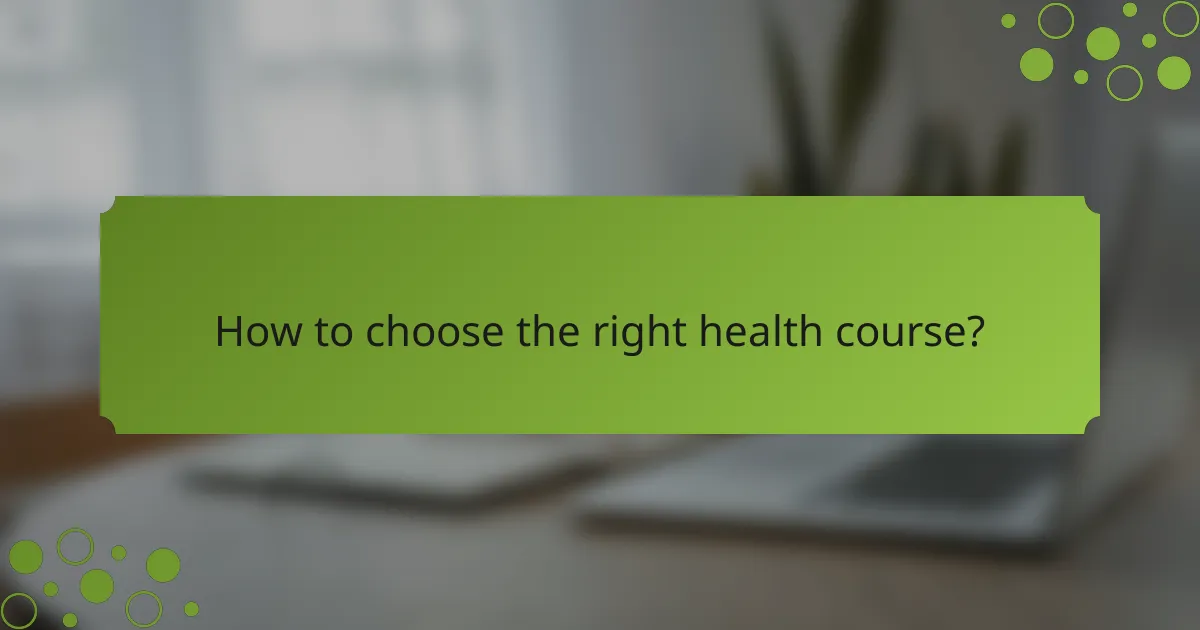
How to choose the right health course?
Choosing the right health course involves assessing the course’s accreditation, the qualifications of the instructors, and the relevance of the content to your personal health goals. Prioritize programs that are recognized by reputable organizations to ensure quality education and effective learning outcomes.
Assess course accreditation
Course accreditation is crucial as it indicates that the program meets specific educational standards. Look for courses accredited by recognized bodies, such as the Commission on Accreditation of Allied Health Education Programs (CAAHEP) or similar organizations in your region.
Check if the course is affiliated with reputable institutions or universities, as this can enhance the credibility of the education you receive. For example, a course from a well-known university may carry more weight in the job market than one from an unaccredited provider.
Evaluate instructor qualifications
The qualifications of instructors can significantly impact the quality of your learning experience. Look for instructors with relevant degrees, certifications, and practical experience in the health field. This ensures they have both theoretical knowledge and real-world insights.
Consider instructors who have published research or have a strong professional background in wellness education, fitness techniques, or nutritional guidance. Engaging with experienced professionals can provide valuable perspectives and enhance your understanding of the subject matter.
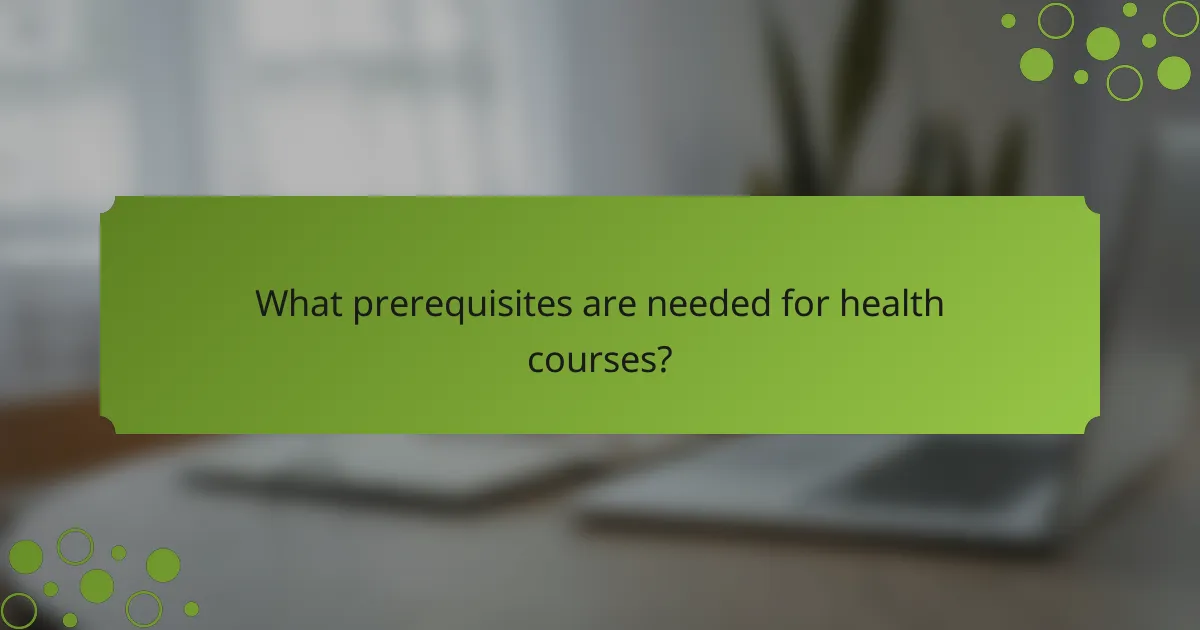
What prerequisites are needed for health courses?
Health courses typically require a basic understanding of health concepts and access to specific materials. These prerequisites ensure that students can engage with the course content effectively and maximize their learning experience.
Basic understanding of health concepts
A foundational knowledge of health concepts is essential for success in health courses. This includes familiarity with topics such as nutrition, fitness principles, and wellness strategies. Students should be able to grasp basic terminology and concepts to fully engage with the course material.
Consider reviewing introductory texts or online resources that cover essential health topics. This preparation can help you understand course discussions and assignments more thoroughly. Engaging with reputable health websites or educational platforms can also enhance your knowledge base.
Access to required materials
Access to specific materials is crucial for participating in health courses. This may include textbooks, online resources, and tools for fitness assessment or nutritional tracking. Ensure you have the necessary materials before the course begins to avoid falling behind.
Check your course syllabus for a list of required resources. Many courses may also recommend supplementary materials that can deepen your understanding. Investing in a good quality fitness tracker or nutrition app can also provide practical insights and enhance your learning experience.
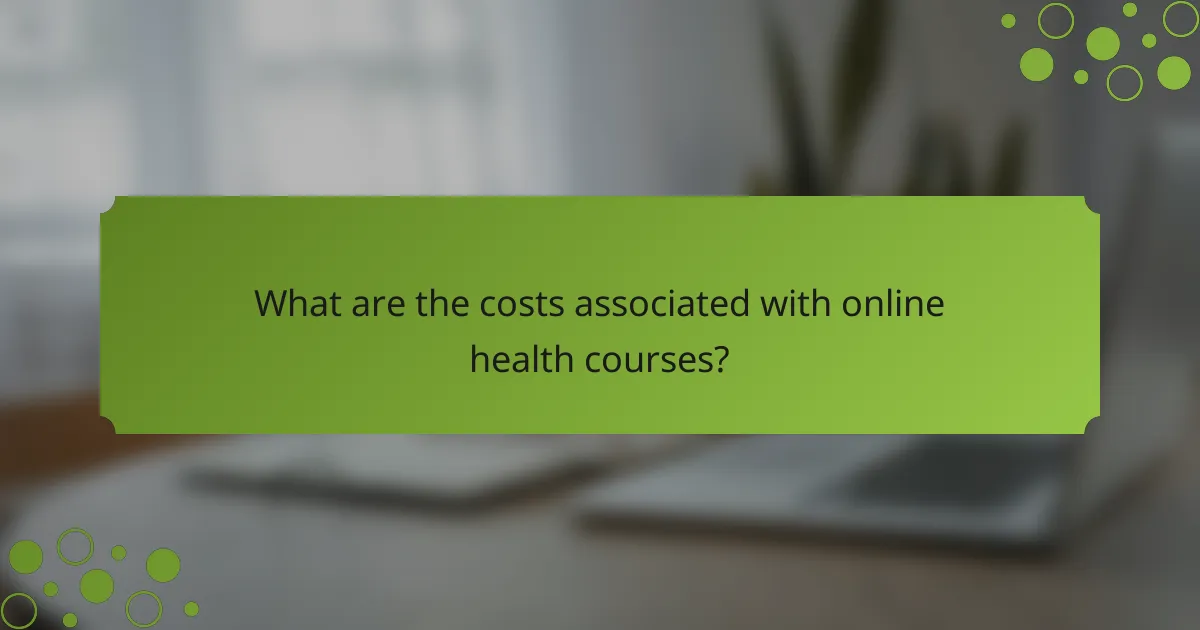
What are the costs associated with online health courses?
The costs of online health courses can vary significantly based on the platform, course content, and duration. Generally, students can expect to pay anywhere from a few hundred to several thousand dollars for comprehensive programs.
Tuition fees for different platforms
Tuition fees for online health courses differ widely among platforms. For instance, well-known platforms like Coursera and edX may charge between $50 to $300 for individual courses, while specialized programs from institutions like Harvard or Stanford can range from $1,000 to $3,000 for full certifications.
Additionally, some platforms offer subscription models, where users pay a monthly fee—typically around $30 to $60—to access a library of courses. This can be a cost-effective option for those looking to take multiple courses over time.
Availability of financial aid
Many online health course providers offer financial aid to help students manage costs. Platforms like Coursera and edX provide options for need-based scholarships, which can cover a significant portion of tuition fees for eligible learners.
Students should check each platform’s financial aid application process, as it often requires submitting documentation to demonstrate financial need. Additionally, some organizations and institutions may offer grants or sponsorships for specific health-related courses, so researching local opportunities can be beneficial.
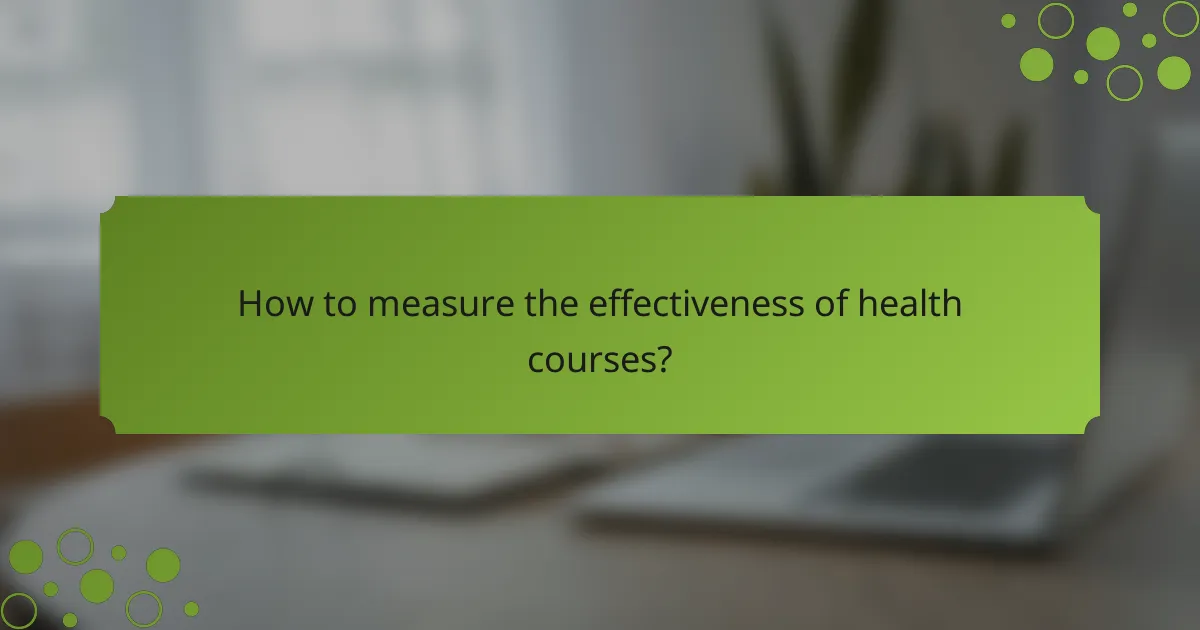
How to measure the effectiveness of health courses?
To measure the effectiveness of health courses, consider various factors such as student feedback, course completion rates, and the application of learned skills in real-life scenarios. Evaluating these aspects provides insights into how well the course meets its educational objectives and the overall satisfaction of participants.
Student feedback and reviews
Student feedback is a crucial indicator of a health course’s effectiveness. Collecting reviews through surveys or direct testimonials can reveal participants’ experiences and satisfaction levels. Look for common themes in the feedback, such as the clarity of instruction, the relevance of content, and the applicability of skills learned.
When analyzing reviews, consider both quantitative ratings and qualitative comments. A course with a high average rating but negative comments about specific aspects may need adjustments. Encourage students to provide detailed feedback, which can help identify strengths and weaknesses in the course structure.
Additionally, comparing feedback across multiple cohorts can highlight trends over time. If a course consistently receives low ratings in a particular area, it may indicate a need for curriculum updates or improved teaching methods.
